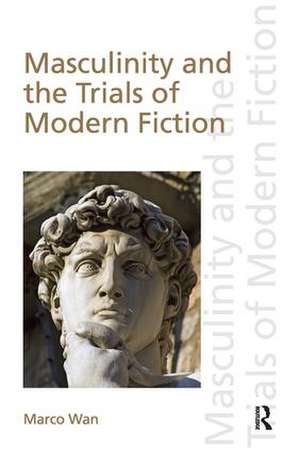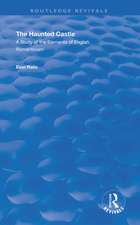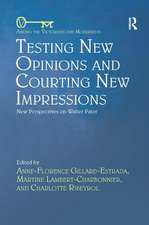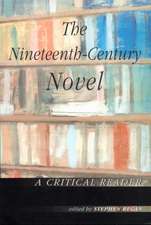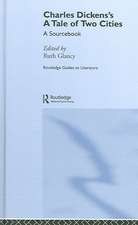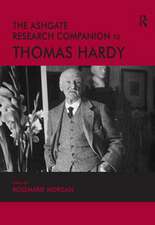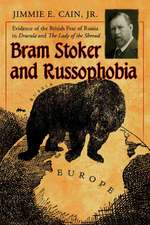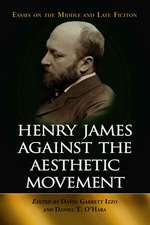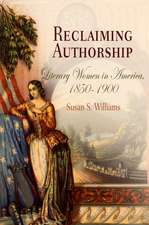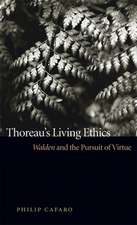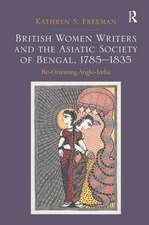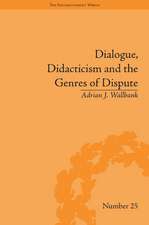Masculinity and the Trials of Modern Fiction: Discourses of Law
Autor Marco Wanen Limba Engleză Paperback – 11 mai 2018
| Toate formatele și edițiile | Preț | Express |
|---|---|---|
| Paperback (1) | 408.54 lei 43-57 zile | |
| Taylor & Francis – 11 mai 2018 | 408.54 lei 43-57 zile | |
| Hardback (1) | 762.97 lei 43-57 zile | |
| Taylor & Francis – 11 noi 2016 | 762.97 lei 43-57 zile |
Din seria Discourses of Law
-
 Preț: 291.20 lei
Preț: 291.20 lei -
 Preț: 415.09 lei
Preț: 415.09 lei -
 Preț: 417.20 lei
Preț: 417.20 lei -
 Preț: 416.22 lei
Preț: 416.22 lei -
 Preț: 280.71 lei
Preț: 280.71 lei -
 Preț: 385.44 lei
Preț: 385.44 lei -
 Preț: 354.54 lei
Preț: 354.54 lei - 9%
 Preț: 935.68 lei
Preț: 935.68 lei -
 Preț: 389.60 lei
Preț: 389.60 lei -
 Preț: 408.03 lei
Preț: 408.03 lei -
 Preț: 387.49 lei
Preț: 387.49 lei - 16%
 Preț: 265.49 lei
Preț: 265.49 lei -
 Preț: 369.77 lei
Preț: 369.77 lei - 18%
 Preț: 1002.80 lei
Preț: 1002.80 lei -
 Preț: 469.34 lei
Preț: 469.34 lei -
 Preț: 482.17 lei
Preț: 482.17 lei - 18%
 Preț: 1126.11 lei
Preț: 1126.11 lei - 13%
 Preț: 322.98 lei
Preț: 322.98 lei -
 Preț: 372.67 lei
Preț: 372.67 lei -
 Preț: 439.41 lei
Preț: 439.41 lei -
 Preț: 469.34 lei
Preț: 469.34 lei -
 Preț: 395.04 lei
Preț: 395.04 lei - 22%
 Preț: 311.51 lei
Preț: 311.51 lei - 26%
 Preț: 850.37 lei
Preț: 850.37 lei -
 Preț: 381.59 lei
Preț: 381.59 lei -
 Preț: 414.32 lei
Preț: 414.32 lei -
 Preț: 445.89 lei
Preț: 445.89 lei
Preț: 408.54 lei
Nou
Puncte Express: 613
Preț estimativ în valută:
78.18€ • 81.83$ • 65.07£
78.18€ • 81.83$ • 65.07£
Carte tipărită la comandă
Livrare economică 31 martie-14 aprilie
Preluare comenzi: 021 569.72.76
Specificații
ISBN-13: 9781138606166
ISBN-10: 1138606162
Pagini: 177
Dimensiuni: 156 x 234 x 10 mm
Greutate: 0.27 kg
Ediția:1
Editura: Taylor & Francis
Colecția Routledge
Seria Discourses of Law
Locul publicării:Oxford, United Kingdom
ISBN-10: 1138606162
Pagini: 177
Dimensiuni: 156 x 234 x 10 mm
Greutate: 0.27 kg
Ediția:1
Editura: Taylor & Francis
Colecția Routledge
Seria Discourses of Law
Locul publicării:Oxford, United Kingdom
Public țintă
Postgraduate and UndergraduateCuprins
1. Introduction: Legal Interpretation, Gender and the Novel
2. The Madame Bovary Trial: Androgyny and Realism’s ‘Lascivious Painting’
3. The Charlot s’amuse Trial: Masturbation and the Scandal of Naturalist Fiction in France
4. The Henry Vizetelly Trials: Patricide and Obscene French Novels in England
5. The Oscar Wilde Trials: The Sodomite, ‘Literary’ Evidence and ‘Legal’ Interpretation
6. The Well of Loneliness Trials: Lesbianism, Male Homosexuality and the Return of the Repressed.
2. The Madame Bovary Trial: Androgyny and Realism’s ‘Lascivious Painting’
3. The Charlot s’amuse Trial: Masturbation and the Scandal of Naturalist Fiction in France
4. The Henry Vizetelly Trials: Patricide and Obscene French Novels in England
5. The Oscar Wilde Trials: The Sodomite, ‘Literary’ Evidence and ‘Legal’ Interpretation
6. The Well of Loneliness Trials: Lesbianism, Male Homosexuality and the Return of the Repressed.
Recenzii
`Masculinity and the Trials of Modern Fiction offers a new and striking contribution to the subject of censorship and the trials of literary texts. The subject has often been treated without Marco Wan’s great subtlety as a reader. He has a remarkable capacity to read the language deployed by the law with the keen critical attention of the literary critic, and then to see how legal issues inflect the modalities of literature. His attention to the discourses of gender implicated in these famous trials gives his study a striking originality. This is one of the best studies of law and literature in intertextual relation that I have ever seen.'
Peter Brooks, Sterling Professor Emeritus of Comparative Literature, Yale University, and Andrew W. Mellon Foundation Scholar, Princeton University
`It is the task of literature to call people back to the radical diversity of forms of life, and modes of desire. Ranging over narratives of the sodomitical, patricidal, onanistic, androgyne, gay and lesbian, Marco Wan’s eloquent and incisive study brilliantly evidences the capacity of the literary to challenge, unsettle and rewrite the strictures of the juridical.'
Peter Goodrich, Professor and Director of the Program in Law and Humanities, Benjamin N. Cardozo School of Law
`Neither before nor since have I written to congratulate an author unknown to me. But I did so in response to an article by Marco Wan on the Oscar Wilde trial, now addressed more fully in Chapter Four of this book. " Fascinating " was what I said. Indeed there is no better word to describe Marco's analysis here of five famous examples of where the establishment desperately resorts to law in order to confront home truths about human sexuality which it regards as socially subversive.'
Nicholas Wilson, Justice of the U.K. Supreme Court.
Peter Brooks, Sterling Professor Emeritus of Comparative Literature, Yale University, and Andrew W. Mellon Foundation Scholar, Princeton University
`It is the task of literature to call people back to the radical diversity of forms of life, and modes of desire. Ranging over narratives of the sodomitical, patricidal, onanistic, androgyne, gay and lesbian, Marco Wan’s eloquent and incisive study brilliantly evidences the capacity of the literary to challenge, unsettle and rewrite the strictures of the juridical.'
Peter Goodrich, Professor and Director of the Program in Law and Humanities, Benjamin N. Cardozo School of Law
`Neither before nor since have I written to congratulate an author unknown to me. But I did so in response to an article by Marco Wan on the Oscar Wilde trial, now addressed more fully in Chapter Four of this book. " Fascinating " was what I said. Indeed there is no better word to describe Marco's analysis here of five famous examples of where the establishment desperately resorts to law in order to confront home truths about human sexuality which it regards as socially subversive.'
Nicholas Wilson, Justice of the U.K. Supreme Court.
Descriere
How do lawyers, judges and jurors read novels? And what is at stake when literature and law confront each other in the courtroom? Nineteenth-century England and France are remembered for their active legal prosecution of literature, and this book examines the ways in which five novels were interpreted in the courtroom: Gustave Flaubert’s Madame Bovary, Paul Bonnetain’s Charlot s’amuse, Henry Vizetelly’s English translations of Émile Zola’s La Terre, Oscar Wilde’s The Picture of Dorian Gray, and Radclyffe Hall’s The Well of Loneliness. It argues that each of these novels attracted legal censure because they presented figures of sexual dissidence – the androgyne, the onanist or masturbator, the patricide, the homosexual, and the lesbian – that called into question an increasingly fragile normative, middle-class masculinity.
